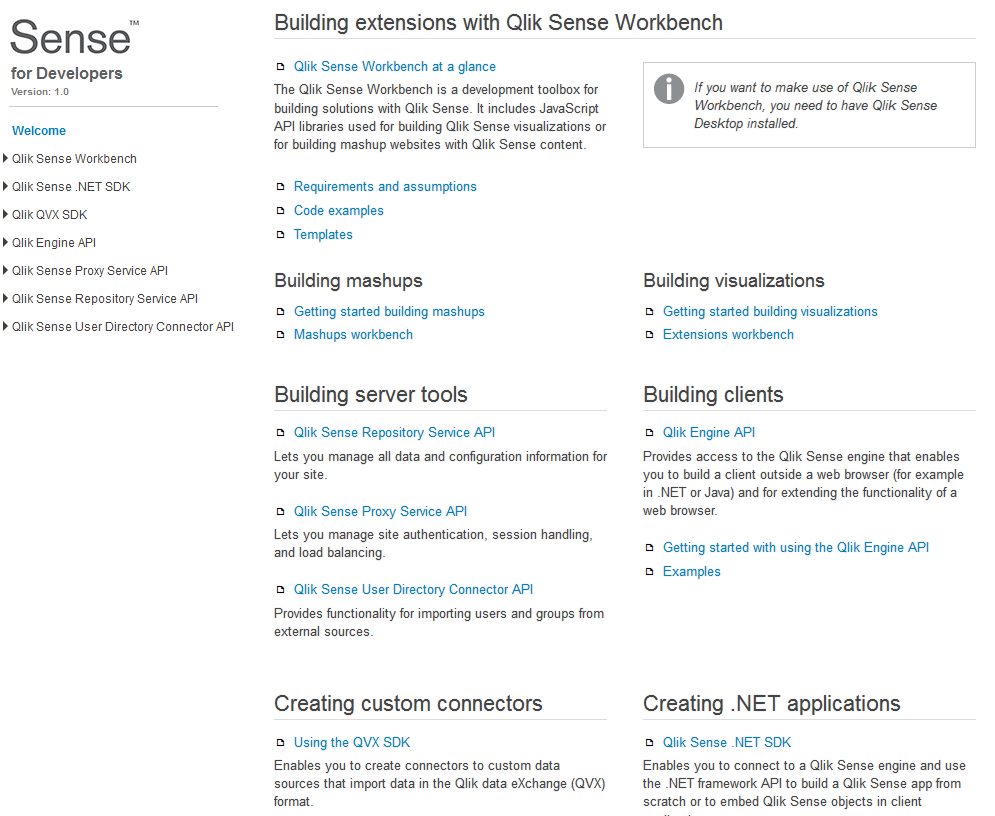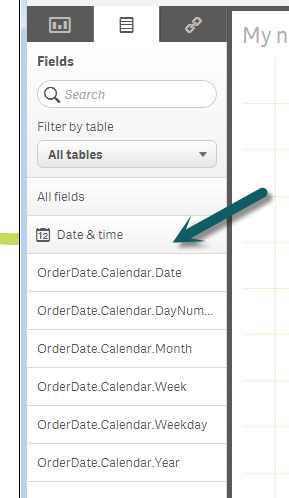Unlock a world of possibilities! Login now and discover the exclusive benefits awaiting you.
- Qlik Community
- :
- Forums
- :
- Analytics
- :
- New to Qlik Analytics
- :
- Re: Adding to Master Items from Data Load
- Subscribe to RSS Feed
- Mark Topic as New
- Mark Topic as Read
- Float this Topic for Current User
- Bookmark
- Subscribe
- Mute
- Printer Friendly Page
- Mark as New
- Bookmark
- Subscribe
- Mute
- Subscribe to RSS Feed
- Permalink
- Report Inappropriate Content
Adding to Master Items from Data Load
Good morning,
I very much like this new approach of having access to Master Items for ease of reuse during app development in Qlik Sense. Like many, I am a great fan of creating variables in order to store complex expressions, or even simple ones, thus simplifying their reuse within a QlikView document.
Knowing this, one might understand that I currently use a sort of externally maintained expression library that gets loaded as variables at the same time the document's data gets refreshed. So, loading expressions into variables, I've pretty much got that covered, and I'm also quite sure I could reuse the same approach in Sense.
But now, knowing that this Master Items feature exists, I am curious to figure out how I could transform my current approach into "automagically" creating Master Items rather than a bunch of variable. Any ideas?
Thanks in advance for your time, regards,
Philippe
- « Previous Replies
-
- 1
- 2
- Next Replies »
Accepted Solutions
- Mark as New
- Bookmark
- Subscribe
- Mute
- Subscribe to RSS Feed
- Permalink
- Report Inappropriate Content
Hi Philippe,
Correct - using the Data Load Editor - this will not populate the Master Items list .... however you could use the API to do so. (I have learned this recently as I have gained more knowledge in this area.)
We have a host of APIs that can automate many manual tasks. The Qlik Engine API has a "Generic Object Definition" - where you can define what we call a "hypercube" using a number of methods. You would define these in a standard JSON structure. There is an example in the Sense platform documentation that customers will be able to view once the product is GA later this month.
So in general, this API will allow you to populate the Master Items list "auto-magically" ![]()
Mike
Mike Tarallo
Qlik
- Mark as New
- Bookmark
- Subscribe
- Mute
- Subscribe to RSS Feed
- Permalink
- Report Inappropriate Content
I am also very interested in knowing if there is an "automagical" way of doing this. For now I have not found a way of doing this on the actual Qlik Sense release.
- Mark as New
- Bookmark
- Subscribe
- Mute
- Subscribe to RSS Feed
- Permalink
- Report Inappropriate Content
Hi Guys - yes you can do this with the Master Items list, but keep in mind a few things:
- Master Items (Dimensions, Measures, configured visualizations) - expressions configured in this way - are just for a specific app
- Currently "expressions" and the name given to them defined in Master Items CANNOT be referenced in another defined Measure / Dimension. This will improve over time.
Using the Load Script to define your variables and expressions, in certain cases, may be the better option.
Let me know if you have any follow up questions, and please remember to mark the question appropriately so our teams and other community members know that they have been answered to your satisfactions.
Regards,
Mike
Mike Tarallo
Qlik
- Mark as New
- Bookmark
- Subscribe
- Mute
- Subscribe to RSS Feed
- Permalink
- Report Inappropriate Content
Thanks for you reply Michael,
So, as I understand it, there is no way to achieve the definition of Master Items from the Data Load.
I guess we'll have to wait for a later release, then.
Cheers,
Philippe
- Mark as New
- Bookmark
- Subscribe
- Mute
- Subscribe to RSS Feed
- Permalink
- Report Inappropriate Content
Hi Philippe,
Correct - using the Data Load Editor - this will not populate the Master Items list .... however you could use the API to do so. (I have learned this recently as I have gained more knowledge in this area.)
We have a host of APIs that can automate many manual tasks. The Qlik Engine API has a "Generic Object Definition" - where you can define what we call a "hypercube" using a number of methods. You would define these in a standard JSON structure. There is an example in the Sense platform documentation that customers will be able to view once the product is GA later this month.
So in general, this API will allow you to populate the Master Items list "auto-magically" ![]()
Mike
Mike Tarallo
Qlik
- Mark as New
- Bookmark
- Subscribe
- Mute
- Subscribe to RSS Feed
- Permalink
- Report Inappropriate Content
Here is a screen shot of the documentation from the on-line help site that will be available:

Mike Tarallo
Qlik
- Mark as New
- Bookmark
- Subscribe
- Mute
- Subscribe to RSS Feed
- Permalink
- Report Inappropriate Content
Hi Mike,
Is there an option where we can categorize/custom sort the measures and visualizations so that it avoids confusion to the users while using if there are too many.
Cheers,
Naresh
- Mark as New
- Bookmark
- Subscribe
- Mute
- Subscribe to RSS Feed
- Permalink
- Report Inappropriate Content
Hi Naresh,
There is something that is in development and you can take a look at it here:
http://help.qlik.com/sense/2.1/en-US/online/#../Subsystems/Hub/Content/Scripting/fields.htm
Currently, it just categorizes the Date / Time fields. - Derive and Declare are two keywords that are used.
Calendar:
DECLARE FIELD DEFINITION TAGGED '$date'
Parameters
first_month_of_year = 1
Fields
Year($1) As Year Tagged '$year',
Month($1) as Month Tagged '$month',
Date($1) as Date Tagged ('$date', '$day'),
Week($1) as Week Tagged '$week',
Weekday($1) as Weekday Tagged '$weekday',
DayNumberOfYear($1, first_month_of_year) as DayNumberOfYear Tagged ('$numeric');
DERIVE FIELDS FROM EXPLICIT TAGS '$date' USING Calendar;

Please mark the appropriate replies as CORRECT / HELPFUL so our team and other members know that your question(s) has been answered to your satisfaction.
Regards,
Mike Tarallo
Qlik
Mike Tarallo
Qlik
- Mark as New
- Bookmark
- Subscribe
- Mute
- Subscribe to RSS Feed
- Permalink
- Report Inappropriate Content
Hi Mike,
Thanks for the response.
I missed this until you mentioned. However, I am looking at the visualizations and the measures but not at the field level.
Cheers,
Naresh
- Mark as New
- Bookmark
- Subscribe
- Mute
- Subscribe to RSS Feed
- Permalink
- Report Inappropriate Content
Hi Naresh,
I thought so - but wasn't sure - at this time - there isn't any plans on grouping or categorizing these, but I will add this to the ideation meeting. Perhaps it may be in there too.
Please mark the appropriate replies as CORRECT / HELPFUL so our team and other members know that your question(s) has been answered to your satisfaction.
Regards,
Mike Tarallo
Qlik
Mike Tarallo
Qlik
- « Previous Replies
-
- 1
- 2
- Next Replies »